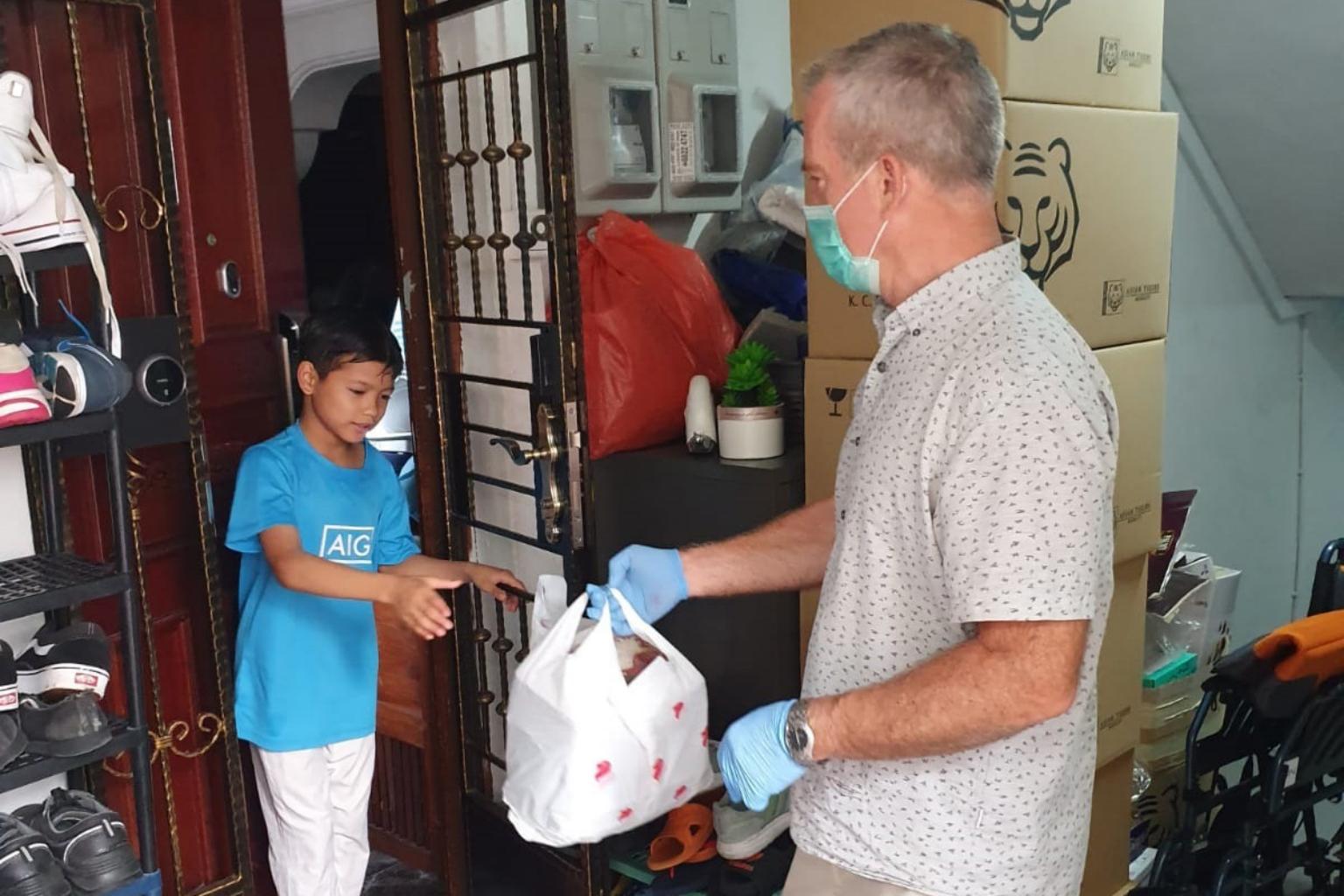Charities providing food support step up efforts amid Covid-19 pandemic
Sign up now: Get ST's newsletters delivered to your inbox

A volunteer from The Food Bank Singapore distributing food under its Feed The City initiative.
PHOTO: THE FOOD BANK SINGAPORE
SINGAPORE - Getting enough food to eat is becoming a problem for a group of Singaporeans, and their numbers are growing amid the Covid-19 pandemic, said major food charities.
These are families who used to get by on their own without support and did not expect that they would need help from charities, but are now struggling due to job loss or income cuts. Many are shy and do not know where to seek help.
And more people are likely to go hungry in the months to come amid a weak jobs market, and when government handouts and schemes taper off, said Food Bank Singapore co-founder Nichol Ng.
During the pandemic, Food Bank has given out at least 2,800 food bundles and 537 emergency ration boxes - mostly to families hit by the crisis. Its Feed The City initiative also delivered cooked food to some of these families.
Another charity, Food From The Heart, has helped about 300 interim beneficiaries since April, while Free Food For All said about 10 per cent of its beneficiaries have lost their jobs during the pandemic.
Ms Ng said the Food Bank conducted a study last year on "food insecurity" in Singapore, and is planning to do another one soon to find out if needs have changed.
Food insecurity is used to describe a situation where people face challenges in obtaining sufficient, safe and nutritious food.
In the in-depth study it commissioned last year, the Food Bank found that one in 10 Singaporeans struggles to get sufficient, safe and nutritious food at least once in the last 12 months. Of this, 10.4 per cent or two out of five households struggle to get such food at least once a month.
The findings were released in September.
Ms Sim Bee Hia, chief executive of Food From The Heart, said: "It takes a lot of courage to ask for food aid. In Singapore, the assumption of many is: Why can't you just buy instant noodles or not have even $3 to buy a packet of chicken rice."
Support for the hungry
Food insecurity is usually a problem for elderly folk living alone and those from low-income families.
Mr Goh Her Yam, 69, and his 54-year-old wife, for instance, have been receiving monthly food packs since 2017. Both do not know how to cook, but Mr Goh is able to make porridge, which the couple eats with canned food items.
In March, Mr Goh lost his job moving cargo at Changi Airport, which paid him a monthly salary of $1,000. Since then, he has been living on a Central Provident Fund payout of $250 a month, and the Covid-19 Support Grant of $800 a month from July to September. He and his wife live in a one-room rental flat in Tampines. She does not work due to chronic health issues, and they have no children.
Since January last year, the couple have been receiving meal cards from Food From The Heart, which they use to get themselves one free meal a day from participating stalls and restaurants under Project Belanja, a meal card programme.
The food support sector is anchored by four large food charities - the Food Bank, Food From The Heart, Free Food For All, and Willing Hearts.
They give out different types of food support, like warm cooked meals, ready-to-eat frozen meals, groceries and meal card programmes. Some run community shops where beneficiaries can regularly pick out some free food items.
Together, they help at least 250,000 people, who are mostly referred to them by the Ministry of Social and Family Development (MSF) or social service agencies.
Social service agencies and other groups give food aid on a smaller scale, like Touch Community Services' Meals-on-Wheels daily cooked food delivery scheme and Persatuan Permudi Islam Singapore's Welfare Trust Fund, which provides monthly food rations.
Tackling duplication
Volunteers from ground-up initiatives also help distribute groceries or cooked food, and their numbers are growing since the pandemic began, said Ms Ng. More help is always welcome but uncoordinated efforts sometimes lead to duplication, which was an issue even before the pandemic, she added.
Mr Nizar Mohd Shariff, founder of Free Food For All, said anyone who wishes to join food distribution efforts should approach food charities to find out how they can help instead of going it alone.
Food charities can buy items at wholesale prices so donating money is also better than buying food and distributing on their own, he added. For those who want to be more hands-on, volunteering is best, he said.


